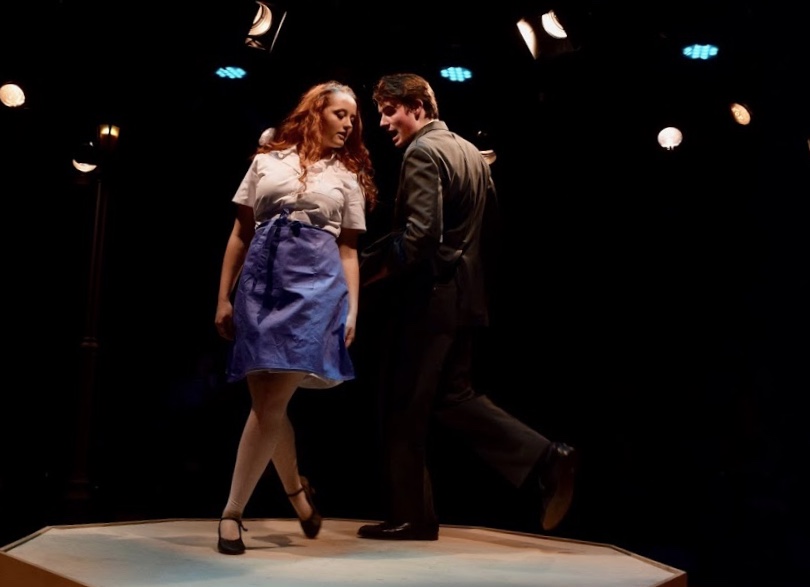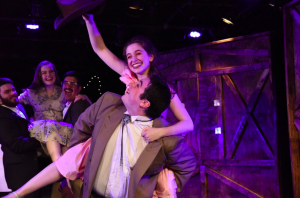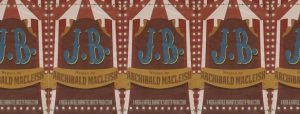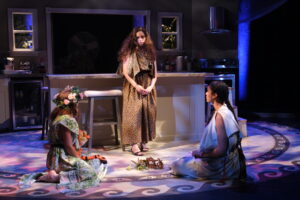This year’s annual Mask And Bauble Dramatic Society musical, Michael LaChiusa’s Hello Again, traversed ten stories in ten decades (ca. 1900’s to 1990’s). Each story depicted a sexual interaction between two people, one of whom always became part of the next decade’s pair. Although Hello Again can get choppy and awkward at times, director Gabriel Berkowitz (MSB ‘20) and Mask and Bauble adapted it with an innovative angle and staging, diversifying the narratives.
Berkowitz explained that Hello Again takes no stance on the issues it presents, rather, the musical simply explores the connections between people and how every interaction affects their future behavior with the next person and so on. “Everything feeds into what happens next,” Berkowitz said. There were innumerable parallels between the different encounters depicted in the performance. Every episode built up to a sexual scene, followed by a disappointing denouement. At least one of the two characters always left without having achieved their goal. Berkowitz called the musical “a chain of love and also a chain of mistreatment.”
This idea of a chain, of every story being connected, was brilliantly depicted visually. The rotating stage signaled the end of the scene and the beginning of another. The movement of the circular stage symbolized the turning of days and years, but also highlighted the cyclical nature of the musical, of the repetition of mistreatment and discontent that didn’t end even at the performance’s closing.
The pairs were always tugging back and forth, interested and then disinterested, wanting some things and then others. Mostly the ambivalence circled around whether to have a sexual encounter or not, and each of them eventually succumbed.
In the transition from script to stage, the production made some intentional changes that succeeded in bringing the 90’s work up to date. “The character of the writer was a male, so we changed that to a female because I thought it was important for both bisexual visibility, and a female-female same-sex relationship that isn’t just playing into: women are slutty and they hook-up with each other,” Berkowitz said. “This is just a female and female relationship.”
In addition to changing the gender of a character, “in terms of portraying sex, in its original form [the musical] was a lot more graphic,” said Berkowitz. “Even the way we do it now there are some parts that I know the audience is shocked by, but we leaned in a lot of places into the more suggested sex through dance, which I liked because it’s a lot more fluid…It’s just sort of everyone flowing into each other.”
Although many of the topics and issues presented in the musical were serious, including coercion, manipulation, adultery, slut-shaming, among others, the performance often seemed more parodic and mocking of the characters and their lives than anything else. One scene in which an older, wealthier man seduced a younger and poorer man while withholding the knowledge that the ship they were in was sinking, was so absurd that when the ship sent a help signal and passengers screamed off-stage, the audience couldn’t help but laugh. It seemed so surreal to sit there, watching two people circle around each other, while unbeknownst to one, they were both about to die. The ethical issues of the man convincing an ambivalent other to have sex, knowing full well that if he told him about the ship he would not get to have sex, were not unfolded. Because of the nature of the musical, many of the issues the scenes raised did not get probed enough.
One thing each story had in common was sex, or some form of it. The musical intentionally pressed into the audience’s willingness to spill the private into the public, to sneak into the taboo parts of people’s narratives that our society normally isn’t open about. Notably, this didn’t apply only to the audience, but also to the actors.
“The biggest challenges have been making people [the actors] comfortable with the material,” Berkowitz said. “It is about sex. Even the people who are not playing sex, there’s intimacy involved. We have two men who dance together, and that was something that took some time for them to get comfortable with. The music is also really difficult…if you don’t feel comfortable with the music and you’re spending the whole time thinking about your notes, you’re not thinking about your character.”
The music served as an important thread throughout the performance, both as signifiers of the decade and the main medium of communication between the characters and scenes. Moreover, live musicians performed most of the music, thus the entire production was pervaded by the existence of additional invisible “characters” who transformed both their styles and their tones as the musical progressed through the ages.
Mask and Bauble’s Hello Again is “something that leaves you with more questions than answers,” said Berkowitz. “How much do you share with someone? How much trust do you put in someone? What I want people to take away from this show is treating people well. The least likable characters in the show are the people who just dismiss people after they get what they want… [and] don’t think about the effect that this treatment is going to have on the way that those people treat the next people that they’re with.”





